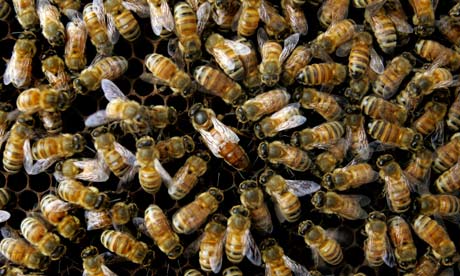Bee conservation: the EU banning three neonic pesticides would be a start
Yes, there are other problems affecting bee populations, but let's stop using these neonics until we are sure they're safe

'To find out how damaging chemicals are to honeybees, we need tests on the whole animal – the colony.' Photograph: Haraz N Ghanbari/AP
When I wrote A World Without Bees to investigate why honeybees were mysteriously disappearing across the US and parts of Europe, one of the conclusions I came to – having talked to beekeepers, scientists, farmers and pesticide manufacturers, and waded through piles of academic papers – was that we must suspend the use of some neonicotinoid pesticides until we had a better idea of what harm they may be causing our bees.
The European commission has an opportunity to do just that on Friday by voting for a Europe-wide suspension of three of these pesticides that have been linked to serious harm in bees. The manufacturers of these bee-toxic chemicals are currently not required to carry out tests on their potential sub-lethal impact on bees. Unlike older types of pesticides that killed bees if they were unlucky enough to be in a field when it was being sprayed, these newer "neonics" – which are coated on the seeds of crops such as sunflowers, sweetcorn and rape seed oil and are transported through its sap, protecting them from bugs as the plant grows – are not lethal to bees on contact at the doses that have been licensed for use. But what the long-term cumulative impact is we just don't know.
The licensing authorities also do not require tests on how the pesticides may be affecting bee larvae. Bees collect millions of pollen particles from flowering plants and it's this bee food that contains miniscule amounts of pesticides. Honeybees bring it back to the hive and feed the protein-rich pollen to thousands of larvae before they metamorphosise into adult bees. You'd think the pesticide companies would be asked to prove their wares weren't harmful to these developing bees. But no.
The colony of honeybees is a superorganism, consisting of up to 50,000 individuals unable to survive by themselves for extended periods of time. To find out how damaging chemicals are to honeybees, we need tests on the whole animal – the colony. Again, nothing. So the pesticides have been approved for use all over the world without the relevant tests being conducted.
Since 2007, when the mysterious disappearance of bees, dubbed colony collapse disorder, hit headlines and raised awareness about the crucial role bees play pollinating three-quarters of global food crops, independent laboratory and field studies have demonstrated some of the harm these pesticides can do to bees. In January, the European Food Safety Authority labelled them an "unacceptable" danger to bees feeding on flowering crops. The pesticide companies deny this.
At the same time as the studies have been sounding the death knell for these pesticides, pressure groups including the campaign group Avaazhave mobilised millions of people to support a pesticide ban in a bid to save the bees.
However, it looks as though it will take more than petitions created at the click of a mouse and a series of high-profile studies to sway the UK, German and Spanish governments to ban chemicals that they argue increase crop yields. The UK government is waiting for the results of more field studies. It has always blamed the honeybees' ailments on the ubiquitous honeybee parasite, the varroa mite, which weakens bees' resilience to viruses; wet summers, which stop bees getting out to forage; and bad beekeeping.
There is no doubt that these are all serious problems faced by honeybees. As a UK beekeeper myself I worry far more about the weather than I do pesticides. My bees could easily starve during this cold spell, for example. So it is disingenuous for campaign groups to promise concerned citizens that they could save bees from extinction if they help to ban neonics. Nevertheless, the scientific consensus is that unusually large bee losses are caused by a combination of parasites, poor nutrition and pesticides. If we eliminate one of the assailants across Europe it won't be a panacea. Any ban would have to go hand in hand with improving varroa control, addressing the junk food diet that monoculture agriculture delivers bees, and reintroduction of hedgerows and wildflowers to provide habitat and food for wild bees. But if we are prepared to do that, then let's bring in a precautionary two-year ban until the correct tests are done to prove once and for all the harm, or not, that neonics are causing our precious bee colonies.

No hay comentarios:
Publicar un comentario